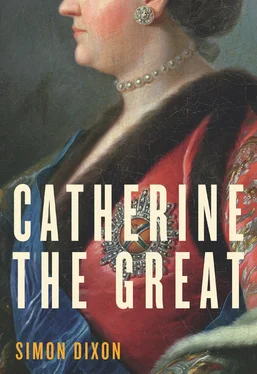Catherine’s readiness to provoke a conflict in defence of Orthodoxy occasioned widespread surprise. ‘Where bigotry baffles reason, and where fanaticism supplies courage,’ Sir George Macartney remarked in 1766, the result was bound to be uncertain: ‘A religious war, however justly undertaken, is always of the most odious nature, and of all wars of the most doubtful success.’ 1However, if the empress’s cause proved unexpected, then there had never been any doubt of her seething ambition. Having entered the Seven Years’ War in 1756 as the junior partner in the anti-Prussian coalition, Russia had emerged by 1763 as ‘the arbiter of eastern Europe’. 2Victories over Frederick the Great at Gross-Jägersdorf and Kunersdorf, not long after he had himself routed the French at Rossbach, had raised memories of the glorious era of Peter the Great. No ambassador accredited to St Petersburg in the early years of her reign could fail to sense Russia’s growing self-confidence. ‘This Court rises hourly higher and higher in her pride,’ Macartney reported in 1765, ‘and dazzled by her present prosperity looks with less deference upon other powers and with more admiration on herself.’ 3
Now Catherine was keen to translate isolated military triumphs into lasting diplomatic prestige. As Joseph II discovered during his visit to Russia in 1780, she was closely involved in day-to-day diplomacy. ‘Among the conversations in which our guest engaged me hourly,’ reported the empress’s secretary, Alexander Bezborodko, ‘he asked me about Her Imperial Majesty’s way of managing business, and was amazed when in answer to his question I said that all the dispatches from our ministry, whether they be sent to our ambassadors or to [foreign] courts, have been approved in draft by the Sovereign herself, so that not a single paper goes out that has not been presented to Her Majesty in the original: he thought that relations or letters were put up to her only in abbreviated form, and only those directly worthy of her attention.’ 4Yet for all her hard work, there was a limit to what Catherine could do. Russia’s finances were as badly dented by the war as any other power’s, her soldiers remained unpaid, and the empress’s position on the throne, though never seriously threatened, even by Mirovich, was sufficiently uncertain to deter any grandiose foreign adventure.
Poland, over which Russia had effectively established a protectorate since 1717, seemed to offer the greatest prospect of gain at the lowest level of risk. In September 1763, the death of King Augustus III (who was also the Elector of Saxony) opened up what Princess Dashkova later described as ‘a vast field for political intrigue’. 5Following the convictions of a lifetime, Chancellor Bestuzhev tried to persuade Catherine to support another Saxon candidate for the Polish throne, acceptable to Austria and France. His failure marked the end of a long career and a decisive moment in Russian foreign policy. Instead the empress decided to support the election of a native Pole—and she knew just who she wanted. Soon after her coup, Catherine had promised Stanislaw Poniatowski that she would make him king, just as Sir Charles Hanbury-Williams had once imagined. According to Dashkova, whose husband died while serving with the Russian troops sent to put pressure on the Poles, Grigory Orlov and Zakhar Chernyshëv were appalled by the idea. Neither relished the prospect of a revival of the empress’s relationship with her former lover. They need not have worried. When it came to international power politics, Catherine always set personal feelings aside. Now it was up to Nikita Panin, who took charge of Russian foreign policy at the end of October 1763, to realise her manipulative intent. 6
It was far from easy for Panin to hold the balance of forces at Court. Behind the scenes, Zakhar Chernyshëv was already so eager to annexe Polish territory that on 6 October he outlined a plan, probably hatched earlier in the spring, to redraw the border along a line similar to the one eventually agreed in the first partition of 1772. 7When the news leaked out, Catherine promptly denied any expansionist ambitions. Claiming that she ruled on the basis of ‘justice, equity and humanity’, a sanctimonious manifesto of December 1763 declared:
If ever malice and falsehood could invent a rumour absolutely untrue, it is certainly that which people have dared to spread about, that we allegedly decided to press for the election of a Diet simply in order that with its help and connivance, we might facilitate the means of invading certain provinces of the King of Poland and the Grand Duchy of Lithuania, to dismember them and then to appropriate them for ourselves and our Empire. The beginning of our reign alone is enough to destroy at its root this sort of fiction and deprive it of all likelihood and foundation. We hold that the prosperity of a people does not consist in foreign conquests. We are firmly convinced that a ruler is only greater when he directs the springs of government towards the welfare and happiness of his people. 8
It was true that Russia had little to gain from conquering a state whose overwhelmingly Catholic population, Jewish minority, unruly noble elite, and direct borders with Prussia and Austria would all have been liabilities to St Petersburg (as indeed they proved in the era of the partitions). But that did not mean that Catherine had no ulterior motives in Poland. In fact, Augustus’s demise provided her with a perfect opportunity to extend her indirect control over a vital buffer state by installing a pliant ruler and keeping his government weak. 9
She knew that her rivals had similar ambitions. ‘Don’t laugh at me because I leapt from my chair when I heard of the death of the king of Poland,’ she warned Panin: ‘the king of Prussia jumped up from his table.’ 10Fortunately for her, Frederick was even more preoccupied by internal reconstruction than she was and decided that his best option was to collaborate with Russia to frustrate his Austrian rivals. Like the Prussians, the French were stymied by their disastrous performance in the Seven Years’ War and without their support the Habsburgs were powerless to intervene. Given this relatively free hand, Catherine was able to engineer Stanislaw’s election in August 1764. 11To Panin, she could hardly restrain her delight:
Nikita Ivanovich! I congratulate you on the king we have made. This event greatly increases my trust in you, since I see how faultless all your measures were. I didn’t want to miss showing you how pleased I am. My back aches so badly that I cannot hold a pen for long, so would you kindly, having explained the reason, take my place on this occasion and write to Count Keyserling and to Prince Repnin, expressing my pleasure at their work and zeal, through which they have obtained no small glory both for themselves and for us. And order a letter to the new King to be prepared for my signature, in reply to his. Either I have rheumatism in my back or I am dying. I fear that it may be a stone, only after a bath it felt better for the first time, so perhaps it is only a chill. 12
There was a price to pay for Frederick’s collaboration, and it came in the form of a defensive alliance with Prussia, concluded in March 1764. In the unstable balance of power bequeathed by the Seven Years’ War, Catherine would have preferred to keep her distance from both Austria and Prussia who were now her main rivals to fill the vacuum created by the decline of French influence in eastern Europe. However, since Austria and Prussia were themselves implacable enemies, competing for the domination of the smaller German states, it was utopian to suppose that Russia could stay neutral for long. 13Since the Austrians remained allied to the French, who continued to resent Russian policies against their traditional satellites, Sweden, Poland and the Ottoman Empire, an Austrian alliance for Catherine was impossible. Frederick, who made it a principle of Prussian policy ‘to seek an alliance with those of one’s neighbours capable of delivering the most dangerous blows’, was swift to see the opportunity presented by Catherine’s ambitions in Poland. 14Outwitting her inexperienced ambassador in Berlin, he inveigled the empress into an alliance by pretending that he might otherwise strike a wholly improbable deal with the Turks. 15
Читать дальше












